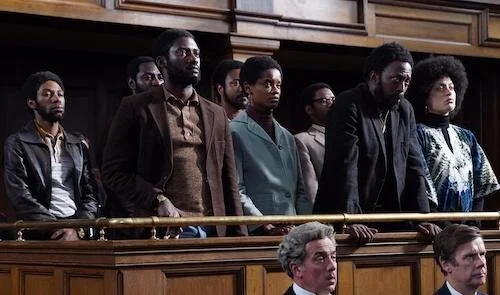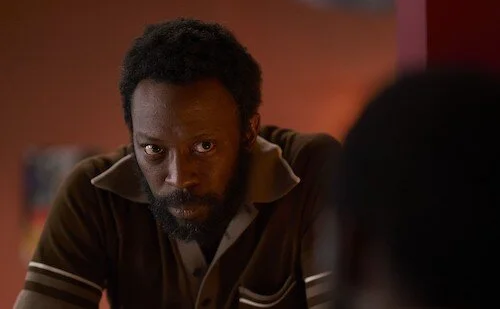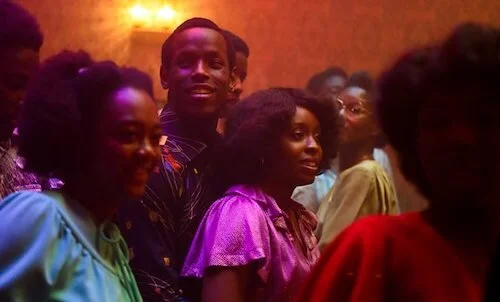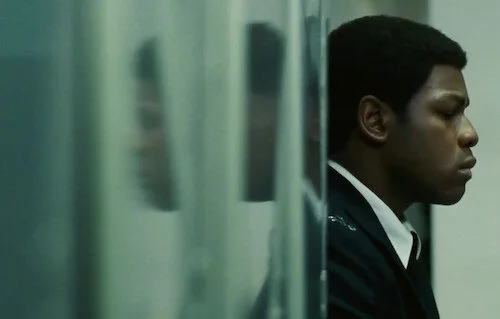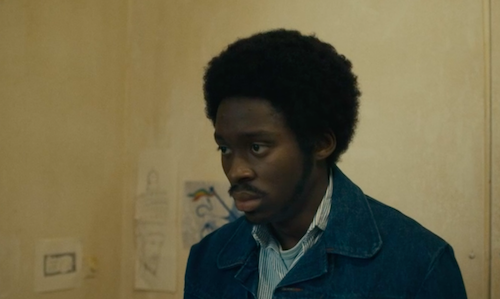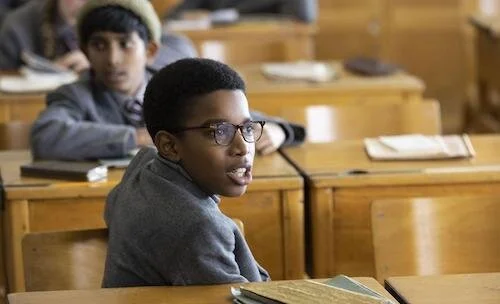Small Axe: Steve McQueen's Tour de Force Anthology Film
The final part of Small Axe (Education) was released last week or so, and now the entire anthology is complete. So, I’ve held off from covering this project until it was completely released, because I think it’s important to cover anthology films as one cohesive unit; Dekalog, to me, is one long film broken up into loosely connected chapters. I wanted to view Small Axe the same way: these are five completely different stories with various casts, but they all deal with the West Indian communities in London, specifically during certain time periods (I believe the range goes from the ‘60s to the ‘80s). What McQueen has crafted is a web of thematic connections, and this is precisely why I figured Small Axe would be an experience worthy of ingesting wholly.
The theme of authoritative corruption in one film gets shown from a different angle in another. The same goes for the sharing of knowledge, the togetherness of loving communities, and other specific themes. A film like Lover’s Rock is gorgeous on its own, but right after Mangrove, it’s the proof of undisturbed black celebration that the previous film showed getting destroyed. Alex Wheatle is a flimsy biographical picture when watched by itself, but it becomes an important cog in the understanding of Small Axe’s stance on the spreading of cultural awareness. Basically, each part strengthens the whole when it comes to Small Axe, so I highly recommend doing the entire series (in one go, if possible). Otherwise, here’s a quick breakdown of each part.
Mangrove
Small Axe starts off ambitiously with its longest segment: Mangrove. Clocking in at over two hours (when every other part is just over an hour long, or certainly under an hour and a half), Mangrove is the most naturally cinematic portion of McQueen’s vision. It’s the only part to feature an original score of any sort (even small doses of Mica Levi are always welcome). It is split up into a three act structure. Basically, Mangrove is likely what you can consider McQueen’s latest feature film when it comes to the typical definition of what kinds of films you’d be seeing in theatres. You’d imagine Mangrove would be savoured as a grande finale for Small Axe, but McQueen plays his biggest cards early for a few reasons. First, there’s predicability: Mangrove is so close to the McQueen we all know and love, and it gets his signature style out of the way for his bigger departures later. Secondly, Small Axe is the kind of series to start off with a bang, as to draw the biggest crowds early on, and Mangrove achieved just that.
The film is a true story about the Mangrove restaurant that opened in West London in 1968, with racist cops trying to close the establishment only a year later. Mangrove captures the lunacy of the charges being claimed simply due to prejudice, by setting up the restaurant itself and its owners and frequent customers. At the right time, Mangrove strikes with the authoritative attacks on the restaurant, and the legendary trial that ensued. McQueen uses his signature grit to add perseverance to the never ending uphill battle of the trial of the Mangrove Nine, and it results in the great courtroom drama of 2020.
Lovers Rock
Two films in, and we have one of Steve McQueen’s finest hours (I’d argue his second best effort after 12 Years a Slave). Lovers Rock is a fascinating film, because it’s the greatest leap away from McQueen’s typically harrowing style that he’s ever gone. There are a few moments of anxiety or fear in Lovers Rock, but the film is otherwise a sublime, blissful experience, which still feels extremely strange to write out. It’s almost more like a Dazed and Confused kind of film than what McQueen usually puts out: a night of mostly joy and escape from the world. It’s as if he channeled Wong Kar-wai and wanted to capture this pit of the human heart that very few directors can find.
The main thing is McQueen still has made Lovers Rock his own, and it shows. His version of an ‘80s blues party is one of the great cinematic moments of 2020 (and certainly the highlight of Small Axe itself). Even amidst the occasional confrontation or moment of panic, McQueen allows the beauty of this film to overtake his usual vision. There are some moments in cinema that are just pure perfection, and you can’t really place a label on why or how. The power going out during Janet Kay’s “Silly Games” with the entire house singing a cappella is one of these moments. I can’t quite say why I didn’t want this moment to end, outside of the fact that it is an unperturbed celebration, driven by the exhilaration of cultural and racial admiration.
Red, White and Blue
The next chapter is back to McQueen’s more damning methods of storytelling, with the son of a victim of police brutality wanting to change the force from the inside (the film is based on Leroy Logan, who actually founded the Black Police Association well after the events shown here). It’s an interesting juxtaposition between a black man suffering the prejudice of cops in society, whilst being shunned by loved ones for wanting to become a police officer. Out of all of the statements made in Small Axe, Red, White and Blue feels like one of the more direct hypotheses, and it shows that it’s a concept that was dear to McQueen. He explores the many outcomes of a black officer trying to pave a new path in a broken society.
The film pulls a bit of a No Country for Old Men in how it ends, but that hardly bothers me. If you don’t know what happens afterwards, the conclusion of Red, White and Blue is a nice big question mark placed over the head of progress, which is especially fitting given the nonstop battle Logan takes part in during the story. If you are aware of the real man, then Red, White and Blue wraps up as a snapshot in a bigger story: the portion that’s most relevant for this particular anthology. As a stand alone film, it’s solid enough to warrant watching, but Red, White and Blue is best suited as a strong part of Small Axe’s universe.
Alex Wheatle
Now, we get to the difficult discussion. I think it’s old news that Alex Wheatle is arguably McQueen’s most critically polarizing effort, and it’s simple: it’s his weakest output I’ve ever seen (I’m also entirely caught up with my Steve McQueen watching). Still, his worst work is better than the best of many other minds, but Alex Wheatle is still so wobbly in an otherwise near perfect anthology that it’s bound to stick out even a little. The biggest problem is that the film would flounder to the brink of death on its own, so being a part of Small Axe guarantees its structure.
The skinny is that the film is a biopic of the titular author, whose writing has detailed his life in Brixton and his experiences as a Jamaican embracing his heritage. The film captures this in anecdotal fashion: an hour just wasn’t enough time for this story. Despite how narratively scant the picture is, McQueen’s direction still renders Alex Wheatle at least engaging artistically. It’s well shot and borderline poetic with how minimalist it feels at times. However, just too much has been left out, and I know that the likely angle was to just project Wheatle’s gradual appreciation of his roots that led to his partaking in the Brixton uprising. On that front, the film achieves its goal very well, but it may not have been the best goal overall. Still, given the amount of talent in front of and behind the camera, Alex Wheatle is a pretty good watch, but an obvious hiccup both in Small Axe and McQueen’s filmography (it’s not bad enough to besmirch either, though).
Education
The final part is a picture I’m going to prematurely declare underrated, and that’s Education. Firstly, I think the tone McQueen takes here is another bold departure from his norm; while not as adventurous as Lovers Rock, Education still has enough warmth in it to feel hopeful at the right moments (McQueen’s typical dread renders Education much more heavy than your typical film about a troubled youth). Education gets right into the schooling system, and the reluctance of the educators of yesteryear to help struggling students (it also gives hateful teachers carte blanche to banish races, sexes, and cultures they don’t wish to work with). The main student of the film (Kingsley) struggles to read, and is also the brunt of bigoted teachers’ gazes. Against his family’s interests, he is banished to a “special” school (which is actually a facility to store “educationally subnormal” children). Quickly you find that this school doesn’t help or even educate students at all, and it’s a one-way ticket to a destroyed life with zero educational prospects.
Watching Kingsley flail between school and home (as he is too scared to bring up the truth to his strict, hard working mother and his rather absent father) is devastating, especially because you are aware of his major aspirations the entire film; McQueen is clever to remind you of the huge promise of people that society gives up on (or flat out neglects). Education leads to the movements that important figures like Bernard Coard created in the ‘70s to inform the public of these shady educational practices. It becomes a rarely hopeful McQueen film (still full of confrontation, mind you), and it’s at this point that it’s clear that McQueen really can take on any kind of mood with his films (he just chooses the feel that he’s best at, usually). I’m used to tearing up with McQueen films because of feeling overwhelmed (like Mangrove), but Lovers Rock and Education allowed me to see a more beautiful side of his capabilities, and I can only hope that we can get to see this kind of work from him more often.
Andreas Babiolakis has a Masters degree in Film and Photography Preservation and Collections Management from Ryerson University, as well as a Bachelors degree in Cinema Studies from York University. His favourite times of year are the Criterion Collection flash sales and the annual Toronto International Film Festival.

